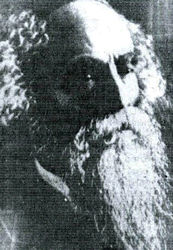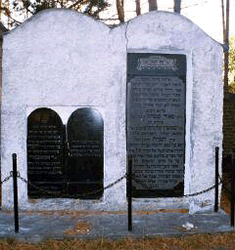The Rogachaver Gaon, Rabbi Yosef Ruzin
All My Children --
Rabbi Yisroel Greenwald
http://www.shemayisrael.co.il/pesach/children.htm
Chinuch - Priorities
I once purchased an uncommon photograph of the Rogachaver Gaon from a
Russian peddler in Jerusalem. The old man appeared neither
particularly learned nor observant, and my curiosity was naturally
piqued: why had he specifically chosen such an unusual article to
sell? He proudly replied that he was born in Dvinsk and that he
remembered the Rogachaver as a child. When I asked him if he had any
memories of the Gadol, he began, "The Rogachaver used to give shiur in
his beis medrash to a group of ba'lei batim, and as was common then,
some children occasionally sat to listen along. Once, the Rav reached
a piece of Gemara he felt was not appropriate for young children, so
he sent us out to go to the courtyard to play. We ran outside and in
the course of our rowdy play we broke some barrels and vessels which
were lying there.
"Apparently the Rogachaver heard the loud crashes, because a short
time later he ran out and screamed at us and expelled us from the
courtyard. We were quite scared, so we kept away the following day as
well.
"When the Rogachaver sat down to give shiur the next day he noticed
that no child was present. A look of distress swept his face and he
cried, "Oy vey, look what have I done! The children are insulted that
I rebuked them yesterday, so they don't want to come back any more!"
The balei batim tried to calm their beloved Rebbi down. "Don't worry!
They caused a lot of damage yesterday - you gave them what they
deserved." The Rogachaver was still not appeased. "Go tell all the
children in my name," instructed the Gadol, "that I want them all to
come back. And tell them that they don't have to worry. They can play
as much as they want in the courtyard, and I promise that I won't yell
at them again."
What is remarkable about this story - apart from its impact on the old
peddler who remembered it even after decades living under Soviet rule
- is the insight it teaches about priorities in chinuch. Not
disturbing a Torah class is important and so is respecting another's
property. But there was an even more important value that the
Rogachaver wished to transmit: that youth remain feeling positive
towards their rabbi, shul, and by extension, towards Torah and
yiddishkeit. Certainly it is proper to reprimand children for breaking
things. But at the cost of causing them to stay away from shul, is
another story.
If the Rogachaver's concerns about the shtetl children of Dvinsk were
applicable nearly a century ago, then how much more today. Despite the
adage, 'boys will be boys,' Generation X (including Generation V and
W) is not built with the same mettle as their century old
counterparts. Contemporary poskim note how 'chulshah' - a spirit of
both physical and psychological weakness - descended on the world, a
factor that at times carries halachic weight. None of the classical
mussar works written over a century ago deal with self esteem;
apparently, to people then it was as natural as breathing. Now, it is
among the subjects most dealt with. Consequently, raising children in
the emotionally fragile world of today may require a different set of
priorities to those of other
generations....http://www.shemayisrael.co.il/pesach/children.htm
Rabbi Yosef Ruzin, or as he is better known The Rogachaver Gaon (the
genius of Rogachav) who passed away some seventy years ago in Russia
was a true phenomenon of Torah genius and erudition.
http://www.crownheights.info/?itemid=766&catid=11
His books are a composite of deep Torah questions followed by long
lists of Talmudic references and obscure commentaries where the
answers can be found.
He knew all the Talmudic tractates with all their commentaries by
heart, but nevertheless he literally never stopped leaning Torah.
His diligence was so outstanding that the great Ohr S'meach, Rabbi
Mair Simcha of Divinsk, once said of him that, 'It can't be said of
him that he has a good memory because there is no aspect of Torah that
he has not recently repeated".
And the previous Lubavitcher Rebbe said of him that his mind was
easily five times that of Albert Einstein's.
Photographs of him show him with a bushy head of hair and it is said
that he did not want to take the time from learning to remove his
Yarmulke and have it cut more than once a year (according to another
explanation it actually hurt him when his hairs were cut due to their
proximity to his brain.)
But despite the Rogachover's greatness and the Rebbe's high estimation
of his mind, he was devoted to the Previous Lubavitcher Rebbe with his
heart and soul and considered himself one of the Rebbe's followers. He
often would invite the students of the Lubavitcher Yeshiva to eat at
his home on the Sabbath and engage them in conversation.
Once he asked them an interesting question; "Can anyone here tell me
what a 'Rebbe' is; not a Rabbi or a scholar or a Tzaddik (holy Jew)
but a Rebbe? They gave a few answers which he considered and rejected
until they finally asked him what HE thought a Rebbe is.
He thought for a few seconds and replied: "What a Rebbe is....no one
can possibly understand.
"But one thing I know; if a Jew, any Jew, even a Jew on the other side
of the world moans in pain, the Rebbe feels it."
This is the idea of Succot: the unity of all Jews though Moses - or
the Moses of each generation.
http://www.crownheights.info/?itemid=766&catid=11
..The very first speaker on this day was the Congregation's leader -
Rabbi Aryeh Feigenbaum. He began with the accepted idea that the two
greatest commandments we recognize are Hafotsas HaTorah (spreading
Torah knowledge) and Kiddush Hashem (sanctification of the name of
G-d).
This thought immediately struck me as a personal directive to continue
the task I had undertaken years earlier - the publication of the notes
and correspondence of the Rogatchover Gaon - Rabbi Yosef Rosen ZT'L.
When the Gaon passed away in 1936, his daughter Rachel Citron left the
safety of her home in Petach Tikva to return to Dvinsk, Latvia for the
purpose of assembling the Gaon's many unpublished manuscripts to make
them available to future generations of Talmud students. She worked
with Rabbi Yisroel Alter Safern-Fuchs (her father's devoted student
and successor). They published two volumes before the Nazi onslaught
prevented further publication in Europe. With utter destruction
approaching, they photographed thousands of pages of the Gaon's notes
and hundreds of incoming questions and mailed them weekly in manila
envelopes to Rav Alter's granduncle, my father Hirsch Safern, in New
York. They begged my father to be sure to deliver everything to the
rabbinic authorities for publication.
Shortly after the last envelope was mailed, the Nazis deported the
Jews from Dvinsk to Breslau where they were all murdered on June 3rd
1942 and lie together in a mass grave.
We cannot share their Kiddush Hashem but we can surely share in their
Hafotsas HaTorah.
The holy task of rescuing this Torah scholarship was begun in 1956
and, working with Rabbi Menachem Kasher z"l, several valuable volumes
were published to great acclaim in the Yeshiva world - but 6000 pages
have yet to see the light of day. Holocaust survivors and their
families - as well as the relatives of the thousands who did not
survive - will be anxious to be involved in publishing this material.
Will you help?"
Mr. Safern was niftar within two days of writing this essay and was
buried on Har HaMenuchot in his beloved Yerushalayim.
Now, to help further the publication of future volumes of Tzafnas
Paneach, please contact his son Eric Safern at 001 (323) 304-0222 or
eric@timebytes.com or Avi Malek (his nephew) in Israel at 02-997-5616.
Baruch Dayan HaEmet.
United States New York

